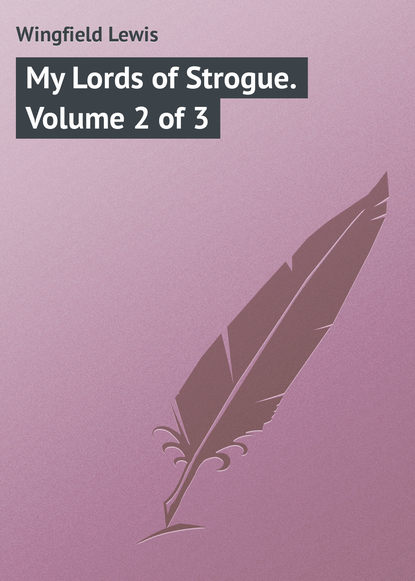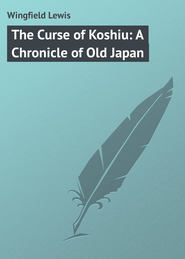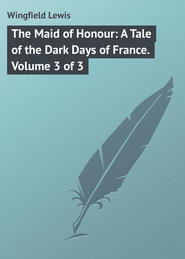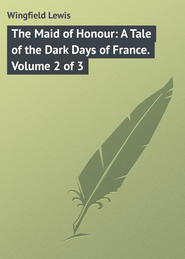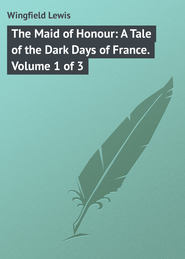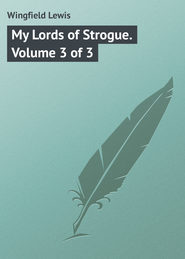По всем вопросам обращайтесь на: info@litportal.ru
(©) 2003-2024.
✖
My Lords of Strogue. Volume 2 of 3
Настройки чтения
Размер шрифта
Высота строк
Поля
'Bless the pigs, meejor! is it you?' she cried, throwing down her scissors. 'Ye've called to ask after my arm? It's mighty kind! The ruffin gave my poor hand a terrible wrench, and sprains are slow to cure. The bleeding's stopped this long while, but the docthor's eating the sowl out of me. I go to be bandaged three times a week. It's not your boys, meejor, that would outrage a leedy so!'
Major Sirr was disconcerted, and began to stammer:
'Glad ye're better, madam-hugely glad! I would not for the world do anything disagreeable to a lady-but business is business, isn't it?'
'What's up?' cried the amazed little woman.
'I'm here, I regret to say, on painful business. May we come inside? Thank you!'
'The meejor's always welcome,' affably returned the other, with one of those superb but ceremonious curtseys wherewith she was wont to electrify the Viceroy. Then, plucking off the kerchief, she whispered audibly to Norah, 'Begorrer, it's rooned we are! To be seen with a square of green silk round mee ould noddle! But the meejor won't tell.'
Major Sirr observed with sorrow that the lady was not so cordial as usual. There was an air of suspicious virtue with the ears set back which distressed him, for he was really partial to her, though he loved her claret better.
''Tis with deepest pain-' he was beginning, when she cut him short.
'Give tongue!' she said curtly. 'What ails you?'
This was a slap in the face. He was accustomed to be fondled and caressed by those whom it was his painful duty to flay alive. She could not be so hoighty-toighty if afraid.
'You are right,' he returned; 'business is business. I regret to say I must search your house, for I've reason to know that Councillor Crosbie is concealed here. I advise you to produce him, and have done with it.'
Oh, Major Sirr! Major Sirr! You should have sent your better-half to cope with Mrs. Gillin. What are a dozen men against one woman, in a battle of wits? What are two dozen men against one woman whose blood is roused, who stands like a tigress 'twixt her whelp and danger?
Major Sirr expected her to change colour, to betray at least a quiver of the lip, a tremor of the fingers; then, recovering herself, to deny largely and pour forth claret with effusion. Such signs would have been the sure tokens of guilt, and he would have known how to act accordingly.
Instead of this she stabbed him, rather too hard for playfulness, with her scissors, and skipped away laughing with elephantine grace. Then wagging her turban at him (which was wofully awry), she set her hands akimbo on her high waistband, thereby sending her elbows almost to the level of her ears, and remarked with unusual bluntness:
'Pah! ye stink of the Staghouse! Stale blood and brains! Go on, hangman; do your worst. Mr. Crosbie was here-has been here for weeks. I won't deny, since ye know all about it. If ye hadn't been a dolt, ye'd have found him long ago. Why, he walked out with Norah each evening on the shore. He was here when the yeoman blackguards wounded and hurt my arm. Do ye think, if it was otherwise, I'd have stooped to give them drink? Not likely! Mr. Crosbie was here, but the bird's flown. You may well look glum. Sorra a drop of the crathur your men'll get out of me this day. Go, search the house; turn it inside out. He lived in the right-hand garret. Ye'll find some of his things about, though he's in Wexford by this time. Here are all my keys (except the cellar key). Search!'
This was disheartening. Behaviour coarse and rude. But duty is duty. Sirr stooped to pick up the keys, which had been tossed to his feet, and, wrapping himself in a rag of dignity, proceeded to examine the premises. It was as she said. There was no one there, though there were signs of recent occupation. Ruefully the major looked into the dining-parlour. There were no nice things laid out for his behoof.
'I've only done my duty,' he urged, as he clutched the virtuous lady's fat hand. 'Don't be cross with me. I'm glad my mission's failed, though I should have won a thousand by it-there!'
But she shook him off and swept away, murmuring over her shoulder, with sniffing nostrils, that she had done with him; would never meet him as a friend again (though her house was open to examination whensoever he was anxious for an outrage); that she would take it as a personal favour if he would save her the pain of cutting him dead in public; for under no conditions whatsoever would she consent to condone this insult.
Sirr was sorry, but shrugged his shoulders. He ordered his men to march on to Strogue. Perhaps the culprit was not gone to Wexford, but was lying perdu in the vaults of the ancient Abbey. Mrs. Gillin screamed to old Jug, from an upper window, to run round to Larry in the farm-buildings, and bid him bring out the carriage. She must go to Dublin to the doctor. Her nerves were rooned now, as well as her spirits and poor arm.
Then, closing the window, she called on the fugitives to come forth.
'There's no time to be lost,' she said. 'Sirr suspects nothing, but the other will. The serpent! He is capable of coming down himself, in a friendly way, to spend the evening; and that's more than I could endure, even for you.'
'Of whom do you speak?' asked Terence, bewildered.
'Don't chatter!' interrupted the kind lady. ''Twill be twilight in an hour or so. You must get out of this before Sirr gets back, and reports to the other what he's done. Then the brute may come, and welcome. It'll be a pleasure to laugh at him. Sirr'll be an hour or so rummaging through the Abbey. Meanwhile you'll take my place in the coach. You're just my size and figure. Your arm looks awful bad. You want a doctor sadly. But that gossoon there; he can't go too, as I've always gone alone. Unlucky! He can't stay, either; that's certain. What'll we do at all?' She tore off the soiled turban to rub her head, for the better coaxing of her ingenuity. Presently she clapped her hands. 'That's it. Ye'll go separate to the same rendezvous. You, Phil, shall go first, for ye must walk. It's like a masquerade in the good old times; yet my heart is dreadful sore-ochone!'
Rapidly Madam Gillin produced some sailor-slops which her own boatman used to wear when she took her pleasure on the bay. 'Phil will wear these and start at once,' she explained. 'His face must not be seen; it's too well known. In the boathouse yonder he'll find a coil of rope. He must bear it on his shoulders as a motive, and let a loop or two fall over his forehead. Be off now, and be careful. Take a knife, in case of accidents. Ye must be clear off before Sirr returns from the Abbey. If by ill-luck ye were to come face to face, stab at his legs. He wears a coat of mail. I felt it with my scissors. Away!'
Phil departed, quite glad of the excitement, delighted to break through his long and weariful incarceration.
Terence was packed in the celebrated wrapper, which once to see was never to forget. A beaver bonnet and veil covered his head. An arm was deftly bandaged. He stepped into the coach, drew up the glasses, and leaning back in the shadow as the coachman whipped his horses, began to collect his thoughts. Whew! What a whirl it was! Why dear Madam Gillin should suddenly become nervous, and wag her plumes so, he could not imagine. Unpleasant things are ofttimes for the best. Concealed in the capital itself he would be all the better able to superintend in person the proceedings of New Year's Eve. Yes! It was quite fortunate that she should thus have sent him off. He would see some of the delegates that very evening; concert passwords and signals. Five minutes' talk is worth a dozen letters. He would send round for Cassidy, who, faithful to his rôle, should be able to unravel for them the ins and outs of the Castle tactics, some of which seemed hazy. He would- What was that? Sirr and his men! Then they had not lingered at the Abbey, but had started Dublinwards before him? No matter. All was right. The major had peered into the carriage, and, perceiving the wounded arm and well-known wrapper, had turned away his head abruptly. How cleverly Mrs. Gillin had managed the whole thing! Why had she taken such a fancy to him? If he were her own son, she could not be more loving and considerate. – What was that? A man bending under a load. Phil, of course. How slow he walked! Sirr's men seemed stepping out. Please Heaven they would not overtake him. No. And if they did, what then? A boor with a burthen of rope. A guilty conscience; how it racks and torments us about nothing!
Hark! a sound-audible through the rumbling coach-wheels. A shout-a cry! Unable to resist the impulse, Terence lowered a glass and protruded his head, with the beaver bonnet and veil. Great heavens! The soldiers had gained on Phil, whose burthen impeded movement; had, from sheer brutality, torn it from him and disclosed his features. He had been recognised! Sirr saw through the trick, and shook his fist with balked fury. He was gesticulating in the road. Some soldiers were hailing the coach from afar, but Larry whipped his horses with a will. Some more, jumping a ditch, had broken through a hedge and vanished. Poor Phil! he would be murdered. Was it not base to leave him thus unaided? Yet-the Cause. Terence felt that his life was not his own. Eagerly he looked backwards as the road took a loop-turn. He must see the last of poor Phil-probably the very last of his faithful henchman. Phil had ceased struggling. Terence drew in his head, and, man though he was, burst into a flood of tears. Poor, faithful Phil! What a sad end!
Half-way betwixt Strogue and Dublin the road leaves the shore, and winds inland with an intricate series of doubles-arranged so for the benefit of certain small villa-holders, round whose tiny properties the way meanders. Terence forgot this fact, so absorbed was he in the fate of his attached servant, otherwise he would have seen his danger, and, throwing off his disguise, would have trusted to a hare's tactics in the open. But, clad in woman's attire, he was weeping like a woman, and bemoaning his fate, when the carriage came to a standstill with a shock. A detachment of soldiers, taking a short cut, had come upon the carriage, and, springing on the bits, had thrust back the horses on their haunches.
Deception was futile now. Dragging off the ignoble bonnet and wrapper, Terence sprang lightly out, and drawing a pistol, prepared to barter his life against as many of the foe as possible.
One man shot poor Larry on his box, lest he should take part in the scuffle; another hamstrung the off-horse, which whinnied, and leaped up with pain. The shot was answered by a hulloo and rush of feet. Through the hedge-gap appeared Sirr, breathless but foaming, urging on his men, two of whom dragged Phil, an inert mass, between them.
'Murther!' groaned Phil. 'That the masther should be tuk, and through me!'
'Yes,' jeered Sirr; 'we have him now. Having detected you, I knew at once that he could not be far off!'
Terence discharged his pistols with good effect. A man fell to each of them. Then, drawing a dagger, he leaned his back against a tree.
Sirr, as his way was on these occasions, withdrew to the rear, content with egging on his hounds from a safe distance. The men waited for a second, watching the eye of the man who stood at bay. Phil saw his opportunity, and took it. With a jerk he freed himself, stabbed one fellow, and, lunging at another, slipped, and tumbled on the moist earth. But he was not to be thus foiled. Wriggling along the ground, he reached Major Sirr, and slashed him across both legs, who, springing into the air with a howl, tossed away the sword-cane that he had unsheathed and fell disabled. Phil caught it, and stabbed the shrieking major again and again till it broke. 'Right she was!' he said; 'the dastard does wear mail!'
The diversion seemed likely to save Terence, who, turning, sped swiftly along the furrows, favoured by sinking twilight.
'Run, masther, run!' Phil screamed. 'Please the Lord, he'll be safe yet.'
'Dead or alive!' howled Sirr, who clawed the ground with his fingers in his pain.
A man levelled his musket and fired. Terence turned like a top, dropped on his knees, then struggling up, moved on as swiftly as before. Another fired, but missed. The fugitive flew on, but not so fast. A mere youth outstripped him, and stooping down in front, tripped him by the feet. Both fell heavily. The bigger of the two being uppermost-his right arm swinging loose-made a desperate effort to throttle the boy with his left hand. It took several men, pressing his chest with heavy muskets, to tear his prey from him, and bind him in such a way as to prevent further resistance.
Terence and Phil were taken to the provost, whilst Sirr (vowing vengeance especially against the latter) was borne away to have the wounds dressed which disfigured his comely calves.
Madam Gillin sat at home in a perspiration, waiting for news. No news! That looked well. It was dawn before she sought her couch, determined to try and sleep. A hubbub aroused the three occupants of the Little House. What was it? eight o'clock! An enormous detachment of soldiers' wives, with kettles, equipage, and baggage, demanding hospitality, producing an official order to that effect. Free quarters; and for women, too-the dirty, drunken drabs! Madam Gillin clasped her fat hands in anguish. Then the stratagem must have been discovered. One had been taken-which? or both? Oh, Heaven! Would no one tell her?
A blowsy wife, more compassionate than the rest, said that all the world knew by this time that the meejor had won the big reward.
Madam Gillin tightened her lips, and said no more, while Jug whistled lamentations through her gums. 'It's the curse of Crummell on the farriers-breed, seed, and branch. If he'd gone alone he'd have been safe.' Which, in all probability, was true enough, though not because Phil chose to wield a firing-iron. But Madam Gillin would not listen to her nurse. Poor lad! To be taken without striking a blow-without even the threadbare satisfaction which belongs to a leader of forlorn hopes-of laying down life, perhaps, but at a heavy price. What an unjust world it is! Mrs. Gillin felt it more and more.
CHAPTER XIII.
THE HURRY
Mr. Pitt's scheme was doing well. Protestants and Catholics, the upper and the lower class, having been successfully set at each other's throats-the leading spirits of the popular party being snugly caged-the executive thought the moment come to harvest their Dead-sea apples. The capture of Terence was accomplished at a fortunate moment; for things had gone too far now for the project of resistance to be tamely abandoned. The proposed rising was perforce postponed that the harried Directory might for a fourth time reorganise itself. Ill-luck haunted that Directory. Tone, inaugurator of the society, was a broken-spirited exile; Emmett, Neilson, Russell, Bond, zealous disciples of their prophet, languished in Kilmainham; the Honourable Terence Crosbie (most promising blossom on the stem) lay wounded-delirious from fever-within the provost. None of the projectors of rebellion were permitted to take part in it; yet it was evident that the days of meek endurance were at an end. The places of the absent were supplied by men, ambitious but incapable: small country gentlemen of limited attainment, or farmers of little culture, who were speedily swallowed by the flood, to be supplanted in turn by furious fanatics, as ignorant but more unscrupulous than they.
Nothing was attempted on New Year's Eve. January and February passed; March and April came, and were gone. Lord Clare wondered whether he had been too precipitate, and digested Sully's saying: 'Pour la populace ce n'est jamais par envie d'attaquer qu'elle se soulève, mais par impatience de souffrir.' Had the people not suffered enough yet? The yeomanry motto had been, 'Soyons frères, ou je t'assomme!' and nobly they had acted on it. The people glared and showed their fangs, ready and willing for the fray; but they were leaderless. Those who in the emergency affected to command, racked by indecision, put off the important moment. Rebel and royalist frowned silently one at the other, lance in rest, both itching to go to work, both declining the odium of the first move. It was the last brief lull of stillness before the bursting of the storm-of the storm which had been so long in bursting. Dublin was uncertain how to proceed. If the Croppies would rise and gain one decisive victory, then Dublin, joining them openly, would turn and tear its rulers. On the other hand, should the Croppies encounter tribulation the capital would grovel at the mumbling Viceroy's feet, presenting both cheeks to the smiter with expressions of Christian meekness.
It was an anxious time for the lord-lieutenant and his Privy Council.
To the chancellor's disgust General Abercromby (who supplanted Carhampton), on whom he had counted for friendly co-operation as commander of the forces, chose this awkward period of uncertainty to retire.
'Nothing,' he bluffly said, 'could justify the behaviour of Government. If the two Houses of Parliament chose to turn their motherland into a slaughter-house, dire retribution would be sure to fall upon them some day. At all events he, a stranger, would have nothing to do with political crimes.' And so he went away; and the supreme command was accepted pro tem, by General Lake, till such time as a fit substitute could be selected.
The attitude of pugnacious Pat, eager for the fight, but lance in rest, could not be permitted to endure. That those who were wont to tread on the tails of each other's coats at Donnybrook should in incongruous fashion assume patience like that of St. Simon Stylites was merely an insult to their masters. A little more humour must be displayed by the friends of England-a few more jokes, quite broad ones now. A dozen or so of judicious murders, a grand confiscation of poor men's cattle, a few more virgins ravished-a real sharp touch of the spur, in fact. The jokers acted with a will, and the desired effect was gained. Kildare rose on the 23rd of May. Simultaneous attacks of a timorous kind were made on various strongholds, of which one only could be pronounced successful. The barrack of Prosperous was surprised in the night, the commandant killed, and a few officers sacrificed, the place committed to the flames. This was encouraging, and Government could well afford the loss of a few lives. But the rebels needed a deal of spurring; they were still too craven for an important venture; their hands were unnerved; their blood was chilled by fear of treachery. Oh! degenerate scions of turbulent Keltic kings!





